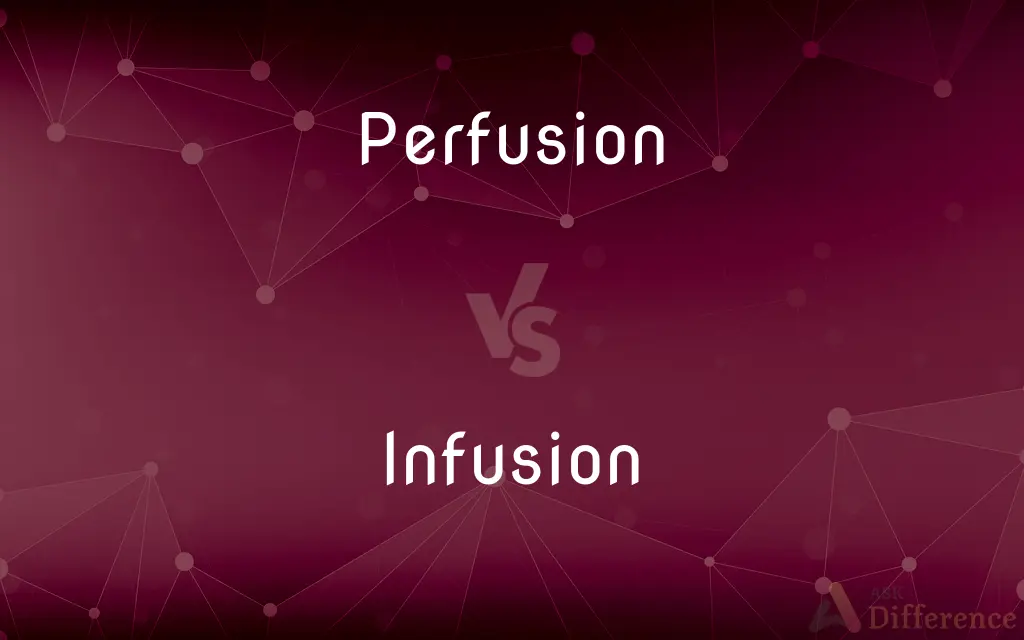Perfusion vs. Infusion — What's the Difference?
By Tayyaba Rehman — Updated on August 23, 2023
Perfusion is the flow of blood through tissues; infusion is introducing fluids or drugs into the body, often intravenously.

Difference Between Perfusion and Infusion
Table of Contents
ADVERTISEMENT
Key Differences
Perfusion refers to the passage of fluid, typically blood, through the circulatory system or a specific organ. It is often used in medical settings to describe how well blood is flowing through the tissues or organs. Infusion, on the other hand, denotes the delivery or introduction of fluid or medication directly into a patient's body, typically through intravenous (IV) means.
Perfusion emphasizes the body's natural circulation process, ensuring that organs receive the necessary oxygen and nutrients carried by blood. A compromised perfusion can be detrimental and might indicate conditions like ischemia or other circulatory issues. In contrast, infusion is a medically administered process. It's a method by which healthcare providers can introduce medications, fluids, or nutrients to a patient.
Perfusion might be assessed in various clinical situations. For instance, during surgeries, especially cardiac ones, perfusion might be closely monitored. Infusion, on the other hand, is a common sight in hospitals and clinics where patients might be receiving IV antibiotics, hydration, or other therapeutic treatments.
In imaging, perfusion studies can be used to visualize the flow of blood in the body or an organ, helping in diagnosing certain conditions. Infusion is utilized in these settings too, as some diagnostic procedures require the infusion of contrast media to make certain structures or abnormalities visible in the images.
When talking about heart health, proper perfusion is critical. It ensures that the heart muscle gets an adequate blood supply. Infusion could be related to heart health when drugs or other therapeutic agents are introduced into the bloodstream to treat or manage heart-related conditions.
ADVERTISEMENT
Comparison Chart
Definition
Flow of blood through tissues
Introduction of fluids or drugs into the body
Medical Relevance
Indicates tissue health
Method of treatment or diagnosis
Usage Context
Natural bodily process
Medically administered process
Visualization
Used in imaging studies
Often involves use of IV lines or ports
Associated Fields
Cardiology, Radiology
Nursing, Pharmacy
Compare with Definitions
Perfusion
Circulation of a liquid through a specific organ or area.
The surgery requires monitoring of cerebral perfusion.
Infusion
The process of introducing a substance into a solution.
The chef prepared an infusion of herbs and hot water.
Perfusion
Distribution of red blood cells to the body's organs.
Good perfusion ensures that organs receive ample oxygen.
Infusion
Medical procedure of delivering drugs or fluids intravenously.
The patient received an infusion of antibiotics.
Perfusion
The process of delivering blood to a capillary bed in biological tissue.
The patient's leg showed poor perfusion after the accident.
Infusion
Steeping a substance in liquid to extract its flavor or medicinal properties.
Herbal tea is an infusion made from plant leaves.
Perfusion
Pumping a liquid into an organ or tissue (especially by way of blood vessels)
Infusion
A product consisting of a liquid which has had other ingredients steeped in it to extract useful qualities.
An extract of rooibos and chamomile makes a refreshing infusion.
Perfusion
The passage of fluid through the circulatory system.
Perfusion of the heart is vital for its function.
Infusion
The act of infusing or introducing a certain modifying element or quality;
The team's continued success is attributable to a steady infusion of new talent
Perfusion
Blood flow to a specific region or organ.
The doctor assessed the perfusion to the patient's kidneys.
Infusion
Introduction of a solution into the body through a vein for therapeutic purposes.
Perfusion
Perfusion is the passage of fluid through the circulatory system or lymphatic system to an organ or a tissue, usually referring to the delivery of blood to a capillary bed in tissue. Perfusion is measured as the rate at which blood is delivered to tissue, or volume of blood per unit time (blood flow) per unit tissue mass.
Infusion
(medicine) The administration of liquid substances directly into a vein for medical purposes; perfusion.
Perfusion
The passage of blood, a blood substitute, or other fluid through the blood vessels or other natural channels in an organ or tissue
Decreased cerebral perfusion may cause impaired consciousness
Infusion
The act of plunging or dipping into a fluid; immersion.
Perfusion
The act or an instance of perfusing.
Infusion
The process of extracting certain active properties (as a drug from a plant) by steeping or soaking (usually in water)
Perfusion
The injection of fluid into a blood vessel in order to reach an organ or tissues, usually to supply nutrients and oxygen.
Infusion
Introduction of a new element or quality into something.
The artist's work had an infusion of abstract elements.
Perfusion
The act of perfusing
Infusion
Infusion is the process of extracting chemical compounds or flavors from plant material in a solvent such as water, oil or alcohol, by allowing the material to remain suspended in the solvent over time (a process often called steeping). An infusion is also the name for the resultant liquid.
Perfusion
(medicine) The introduction of a drug or nutrients through the bloodstream in order to reach an internal organ or tissues.
Infusion
The act or process of infusing.
Perfusion
The act of perfusing.
Infusion
Something infused or introduced
An economy in need of regular capital infusions.
Infusion
The liquid product obtained by infusing
Prepared an infusion of medicinal herbs.
Infusion
The solution so introduced
A sucrose infusion.
Infusion
The act of steeping or soaking a substance in liquid so as to extract medicinal or herbal qualities.
Infusion
The act of installing a quality into a person.
Infusion
(obsolete) The act of dipping into a fluid.
Infusion
The act of infusing, pouring in, or instilling; instillation; as, the infusion of good principles into the mind; the infusion of ardor or zeal.
Our language has received innumerable elegancies and improvements from that infusion of Hebraisms.
Infusion
That which is infused; suggestion; inspiration.
His folly and his wisdom are of his own growth, not the echo or infusion of other men.
Infusion
The act or process of steeping or soaking any substance in water in order to extract its active principles.
Sips meek infusion of a milder herb.
Infusion
A solution obtained by steeping or soaking a substance (usually in water)
Infusion
(medicine) the passive introduction of a substance (a fluid or drug or electrolyte) into a vein or between tissues (as by gravitational force)
Infusion
Transfer of liquid from one vessel to another.
The wine underwent an infusion process to enhance its flavors.
Common Curiosities
What does infusion mean in healthcare?
Infusion is the process of delivering fluids, medications, or nutrients directly into a patient's body, typically through intravenous means.
What is perfusion in medical terms?
Perfusion refers to the flow of blood through the body's tissues and organs, ensuring they receive necessary nutrients and oxygen.
How is perfusion assessed?
Perfusion is assessed through various clinical methods like physical examination, imaging studies, and monitoring equipment to determine blood flow to tissues or organs.
Why is infusion important in treatments?
Infusion allows for the direct delivery of therapeutic agents, such as drugs or fluids, into the bloodstream, providing faster and often more effective treatment.
Can poor perfusion lead to complications?
Yes, poor perfusion can lead to tissue damage, organ failure, or other serious complications as tissues may not receive adequate oxygen and nutrients.
Are there side effects associated with infusion?
Yes, potential side effects of infusion depend on the substance being infused but may include allergic reactions, infections at the infusion site, and other drug-specific reactions.
How is perfusion related to heart health?
Perfusion is directly tied to heart health as it denotes how well the heart is supplying blood, carrying oxygen and nutrients, to the body's tissues.
What can affect perfusion in the body?
Several factors can affect perfusion including blockages, bleeding, heart conditions, and vascular diseases.
How long can an infusion therapy last?
The duration of infusion therapy varies based on the treatment; it can be as short as a few minutes or extend over several hours.
What are common fluids given by infusion?
Common fluids given by infusion include saline, glucose solutions, and medications like antibiotics or chemotherapy drugs.
Share Your Discovery

Previous Comparison
Dysphasia vs. Aphasia
Next Comparison
Gave vs. GiveAuthor Spotlight
Written by
Tayyaba RehmanTayyaba Rehman is a distinguished writer, currently serving as a primary contributor to askdifference.com. As a researcher in semantics and etymology, Tayyaba's passion for the complexity of languages and their distinctions has found a perfect home on the platform. Tayyaba delves into the intricacies of language, distinguishing between commonly confused words and phrases, thereby providing clarity for readers worldwide.
















































